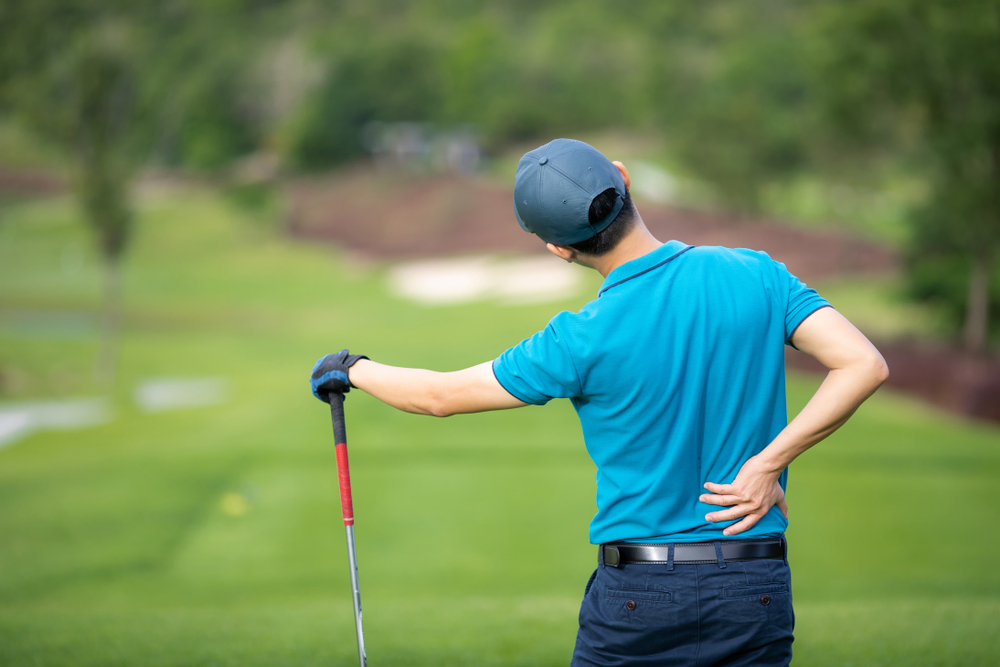According to the National Golf Foundation, 37.5 million people play golf annually. While millions play golf, the injury rates are higher than expected, especially in the lower back. In one study of 1170 male non-professional golfers, 37% reported back pain within the last 7 days. If back pain is hurting your golf game, this article is for you.
Due to the high demands on the body during the swing, overuse injuries are common in golf. The golf swing causes an asymmetrical load on your body. During the swing, you repeatedly swing from your dominant playing side. If you play golf often, the natural asymmetrical stress of the game leads to overuse injuries.
Also, stress on your spine during the golf swing is very high. One study reported forces as much as 8 times your body weight. Thankfully, there are things you can do to decrease the stress placed on your back during your golf swing.
Basics of the Golf Swing

The golf swing consists of 5 phases:
- The address
- Backswing
- Downswing
- Impact
- Follow through.
Because the golf swing is complex, it requires large amounts of mobility and muscular control. Also, the golf swing is highly variable from person to person. Research does not suggest there is one ideal golf swing for everyone. Your specific strength, mobility, and coordination dictate what features of the golf swing are most important for you.
Some healthcare providers and fitness specialists have earned advanced certifications for examining and treating golfers. The Titleist Performance Institute (TPI) is the most prestigious and well-respected of these certifications. Your TPI-certified physical therapist will examine your mobility and strength to determine the best method to improve your golf game and decrease stress on your back.
Which Golfers Are at Risk for Back Pain?

A 2018 study looked at which golfers are at risk for hurting their back. 3 factors were linked to back pain in recreational golfers:
- Previous history of back pain
- Older age
- Elevated body mass index (BMI)
If you are older, heavier, and have had back pain in the past, you are at risk for more back pain in the future. A few other factors with mixed research were also identified. Other factors include playing more often, how many ball strikes during the week, and your hip mobility.
A TPI-certified therapist is an expert in identifying specific components of your swing and game that could leave you at risk for injury. While evidence is inconsistent for the cause of injuries, an evaluation quickly identifies weaknesses to improve your game and safety while playing.
Treatment for Back Pain in Golfers
Research for the treatment of golfers with low back pain is highly limited. As a result of this, a highly personalized approach is needed. Your physical therapist expertly crafts a plan targeting your limitations in motion and deficits in strength.
Addressing faults in your golf swing will improve your golf game and lower your risk for injury. After your comprehensive assessment, your therapist creates an optimal training regimen to keep you on the course or get you back on the course. In most instances, a few minutes of exercise at home each day is enough to keep you on track.
Common areas in which golfers show deficits include a lack of hip mobility, poor upper back rotation, and muscle imbalance in the trunk. Examples of treatments to address these deficits include hip joint manual therapy, thoracic spine rotation exercises, and side planks.
Schedule a Free Visit with A TPI-Certified Physical Therapist
If you are struggling with your golf game or are being held back by an injury, an evaluation by a physical therapist is for you. Often, a 30-minute evaluation from a therapist leads to improvements in your golf game.
At BSR we offer a free golf evaluation in our Manahawkin location. During your evaluation, we will look at your mobility, strength, and golf swing to identify the most important things for you to work on. Call our office (609-549-5015) to schedule your free golf evaluation.


